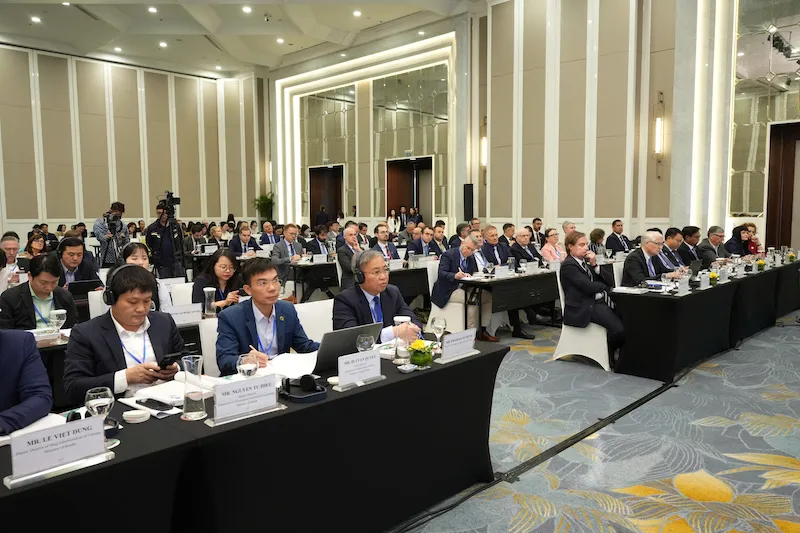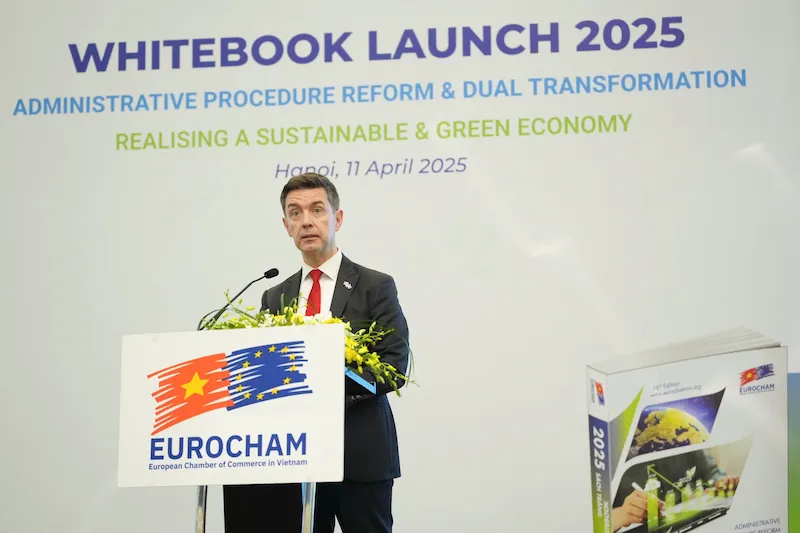Amid US tariffs, EU sees opportunity to expand trade with Vietnam
As global trade faces mounting uncertainty, the European Union sees Vietnam as a key partner in building resilient supply chains and expanding economic cooperation.
THE HANOI TIMES — Julien Guerrier, Ambassador and Head of the European Union (EU) Delegation to Vietnam, spoke to The Hanoi Times about trade prospects and strategic cooperation amid global economic shifts.
Could the current global uncertainties be seen as an opportunity for the EU and Vietnam to deepen economic ties and reinvigorate bilateral cooperation?

Domestic and foreign delegates attend the Whitebook Launch 2025 hosted by EuroCham Vietnam on April 11. Photos: EuroCham Vietnam
Yes, the latest international trade developments are reinforcing both the need and the opportunity for Vietnam and the EU to work together. This collaboration aims to support the multilateral trading system and create possible business partnerships.
We can rely on the EU-Vietnam Free Trade Agreement (EVFTA) and the upcoming EU-Vietnam Investment Protection Agreement (EVIPA) to enhance investment and trade flows between the EU and Vietnam.
My advice to the Vietnamese government, as Prime Minister Pham Minh Chinh has pointed out, is to focus on reliable partners. It is important to diversify trade relations and create more opportunities, especially with FTA partners like the EU that are stable, trustworthy, and committed.
I also encourage Vietnam to continue investing in domestic growth, in particular in infrastructure. The EU stands ready to support these efforts through the Global Gateway Initiative, which aims to advance the energy transition, achieve climate neutrality by 2050, accelerate digital transformation, modernize the economy, and promote sustainable transport.
I am confident that these large-scale investments, both necessary and achievable, can generate strong domestic growth and bring benefits to both European and Vietnamese companies.
How do you assess the Vietnamese government’s response to these global trade challenges? Given that the US accounts for just 13% of world trade,
In fact, Vietnam is particularly exposed to exports to the US, with 30% of Vietnamese exports going to the US. But the US represents 13% of world trade, so there is still 87% of the world that we need to look at to develop new business opportunities that can more than make up for the lost with the US.
The EU is a reliable and stable partner and we are ready to forge partnerships with Vietnam, diversify Vietnam's exports, and jointly realize growth prospects while supporting a stable global trading system for the benefit of both Europe and Vietnam.
What is your view on the potential impact of the newly announced reciprocal tariffs on EU businesses operating in Vietnam?

Julien Guerrier, Ambassador and Head of the European Union Delegation to Vietnam, speaks at the opening ceremony of the Whitebook Launch 2025 held on April 11.
Of course, we deeply regret the announcement of reciprocal tariffs. And it is not just the tariffs that have already been imposed; there is also the possibility that more could be reintroduced in the future.
The US currently has a 25% tariff on European cars and another 25% on steel. In addition, a general 10% tariff remains in place, which we believe is entirely unjustified. The tariffs raise input costs and contribute to inflation, particularly for US consumers.
That said, the feedback I have received from European companies operating in Vietnam has been cautiously optimistic. These companies do not primarily invest in Vietnam to export to the US, most produce for domestic market, for other Asia-Pacific destinations, or export back to Europe. The proportion of European foreign direct investment in Vietnam aimed at the US market is relatively small, so we expect the impact to be limited.
What are your recommendations to both Vietnamese and European firms in Vietnam to mitigate the risks of global trade volatility and protect their export potential?
Yes, absolutely. I would advise European companies and Vietnamese companies in the country to look in particular at their supply chains and ensure that they are resilient for the future. We know that the US is going to be particularly focused on making sure that there is no transshipment from China through Vietnam or other countries.
So it is important for our companies to produce as much as they can in Vietnam. It will be good for the development of the Vietnamese economy and good for the future resilience of supply chains and exports to the US and the world in general.
Thank you for your time.












